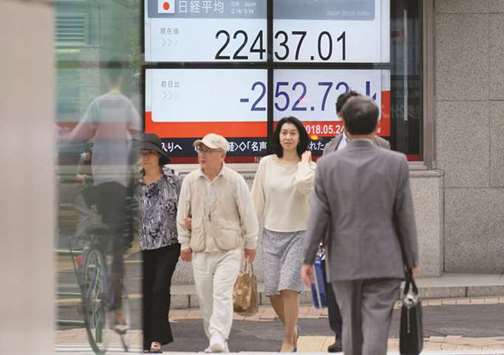Asian markets mostly rose yesterday but traders remain concerned about the China-US trade deal and Donald Trump’s summit with Kim Jong-un, while automakers were hit by news Washington was considering huge tariffs on vehicle imports.
Investors went into selling mode despite minutes from the Federal Reserve’s latest policy meeting that showed the central bank was less hawkish on interest rates than previously thought.
The selling is a far cry from the start of the week when equities rallied on news that top officials from China and the United States had agreed to pull back from imposing levies on billions of dollars of goods, averting a potentially damaging trade war.
But since Monday’s gains, Trump has voiced his displeasure at that agreement and also raised the possibility that a historic summit with North Korean leader Kim on June 12 could be delayed or called off.
A key aide to Kim yesterday hit out at comments from Vice President Mike Pence and warned the talks could be cancelled.
Japan’s Nikkei was the biggest loser, shedding more than 1% in the morning session as the yen surged against the dollar to its highest level in nine days.
As the latest developments fuel uncertainty, investors have shifted into the Japanese unit, which is seen as a safe haven.
Adding to selling in the greenback were the Fed minutes, which showed it may be willing to let inflation run slightly higher and above its 2% target, as long as the spikes were temporary.
The comments soothed worries about a sharp hike in borrowing costs, which have been needling markets for several months.
But while the minutes lifted Wall Street, Asian investors were harder to please.
Hong Kong was 0.3% higher at 30,760.41 and Singapore added 0.6% but Shanghai fell 0.5% at 3,154.65, Seoul shed 0.2% and Sydney was slightly higher.
Wellington, Taipei, Manila and Jakarta were all up and Bangkok was down.
Regional auto giants were sharply lower after the Commerce Department said it had launched a probe that could allow Trump to impose tariffs on auto imports over national security concerns.
“There is evidence suggesting that, for decades, imports from abroad have eroded our domestic auto industry,” Commerce Secretary Wilbur Ross said.
Japanese giant Toyota plunged more than 3% and Nissan fell 1.8% in Tokyo, while Kia dived 2.8% in Seoul.
The announcement came just a day after China said it would slash levies on imports of cars from July 1 as part of a drive to open up the world’s number two economy. “What can I say? The mid-term (US elections) are looming large in the president’s thinking and almost everything he does in the next six months is likely to be aimed at his base.
That’s politics.
But it will impact markets as well,” warned Greg McKenna, chief markets strategist at AxiTrader.
On currency markets the euro edged up but is still wallowing around levels not seen since mid-November as traders fret over the impact on the Italian economy of a new populist government, which has promised big tax cuts, big spending measures and the rollback of reforms.
Adding to the downbeat outlook for the currency is a series of weak readings including on economic growth and factory activity.

Pedestrians walk past a stock indicator showing share prices on the Tokyo Stock Exchange. Tokyo’s benchmark Nikkei index fell for the third consecutive session yesterday, with automakers battered by news that Washington was considering possible tariffs on automobile imports.
